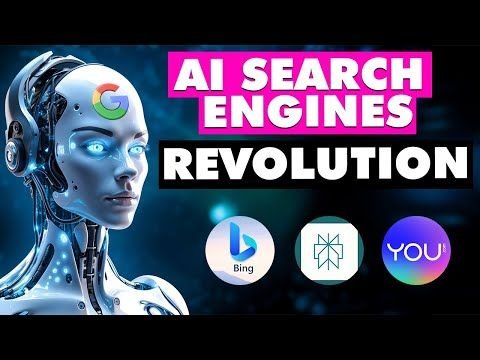Introduction
Think about the last time you searched for something online. AI Search Engines Maybe you needed a pasta recipe, you were trying to figure out a strange symptom, or you couldn’t remember the name of that actor from a half-forgotten movie.
For years, search engines worked like giant card catalogs: you typed in a few keywords, and they handed back a long list of pages that might be relevant. It was useful, but also clunky.
Now the internet has exploded into something far bigger, faster, and messier. And that’s where AI-powered search comes in. Instead of just matching words on a page, these systems try to understand what you actually mean. They read between the lines, summarize the important stuff, and in many cases, give you a straight answer instead of burying you under dozens of tabs.
In short: AI is rewriting the way we look for information.AI Search Engines
What Makes an AI Search Engine Different?
Here’s the simplest way to put it:
Old-school search: You type “best Italian food” and get a list of websites that happen to contain those words.
AI search: It tries to figure out your intent. Do you want restaurant recommendations nearby? A list of recipes? A breakdown of reviews? It can clarify, summarize, and even nudge you with follow-up questions.
If you’ve used tools like ChatGPT, Perplexity, You.com, Google’s experimental Search Generative Experience, or Bing’s AI Copilot, you’ve already seen this shift. It feels less like searching and more like having a conversation with something that understands context.
A Quick Look Back
The evolution of search tells the story:
1990s: Yahoo! and AltaVista acted like giant directories. Search meant simple keyword matching.
2000s: Google flipped the script with PageRank, ranking results by relevance and authority.
2010s: Smartphones, voice assistants, and personalized results made search smarter, but still keyword-driven.
2020s: AI enters the picture. Suddenly, you can ask questions in plain language and get answers that pull from across the web — text, images, voice, even video.
The web keeps getting noisier. Smarter search is how we keep it usable.
Why It Matters
Searching today isn’t just about finding something — it’s about finding the right thing without wasting time. That’s what AI Search Engines brings to the table:
You can ask questions the way you’d ask a friend.
It remembers what you’ve already asked, so you don’t have to start over.
It’s condenses pages of results into a single clear answer.
If traditional search was a map, AI search feels more like having a local guide who knows the shortcuts.
Where It’s Already Making a Difference
AI search isn’t just a novelty. It’s quietly reshaping entire fields:
Education: Students can get clear explanations instead of sifting through endless blog posts.
Healthcare: Doctors and patients can surface research in seconds instead of hours.
Customer service: Chatbots deliver instant, relevant answers without wait times.
Business and research: Analysts can skip the noise and pull key insights straight from documents.
Chances are, you’ve already felt these benefits without realizing AI was behind them.

—
Why You Should Care
The way we search shapes the way we think, learn, and make decisions. AI-powered search matters because:
Your time is valuable. No more digging through ten tabs for one answer.
Your choices get better. The results are clearer and more relevant.
Your possibilities expand. You’re no longer limited to text — you can search across formats and even have conversations with the system.
Search engines have always been our gateway to knowledge. AI is turning that gateway into something closer to a guide — faster, more personal, and more useful than anything we’ve had before.
Frequently Asked Questions
1. Will AI search engines replace Google completely?
Not anytime soon. Google and other big players are already weaving AI into their platforms. What’s changing isn’t the company you search with — it’s how that search feels.
2. Are AI search engines always accurate?
They’re getting better, but like any tool, they can make mistakes. Think of them as a guide who’s fast and helpful, but still worth double-checking on important details.
3. Do I need to pay for AI-powered search?
Many AI search features are free or built into tools you already use. Some advanced versions offer paid plans with more power, but you can experience the basics at no cost.
4. How is AI search different from voice assistants like Siri or Alexa?
Voice assistants mostly give quick, surface-level answers. AI search engines dig deeper, summarize across sources, and let you keep asking follow-ups — almost like a real conversation.
5. Should I be worried about privacy when using AI search? It depends on the provider. Some AI search tools store queries to improve results, while others emphasize privacy. As with any online service, it’s worth checking their policies before diving in…

